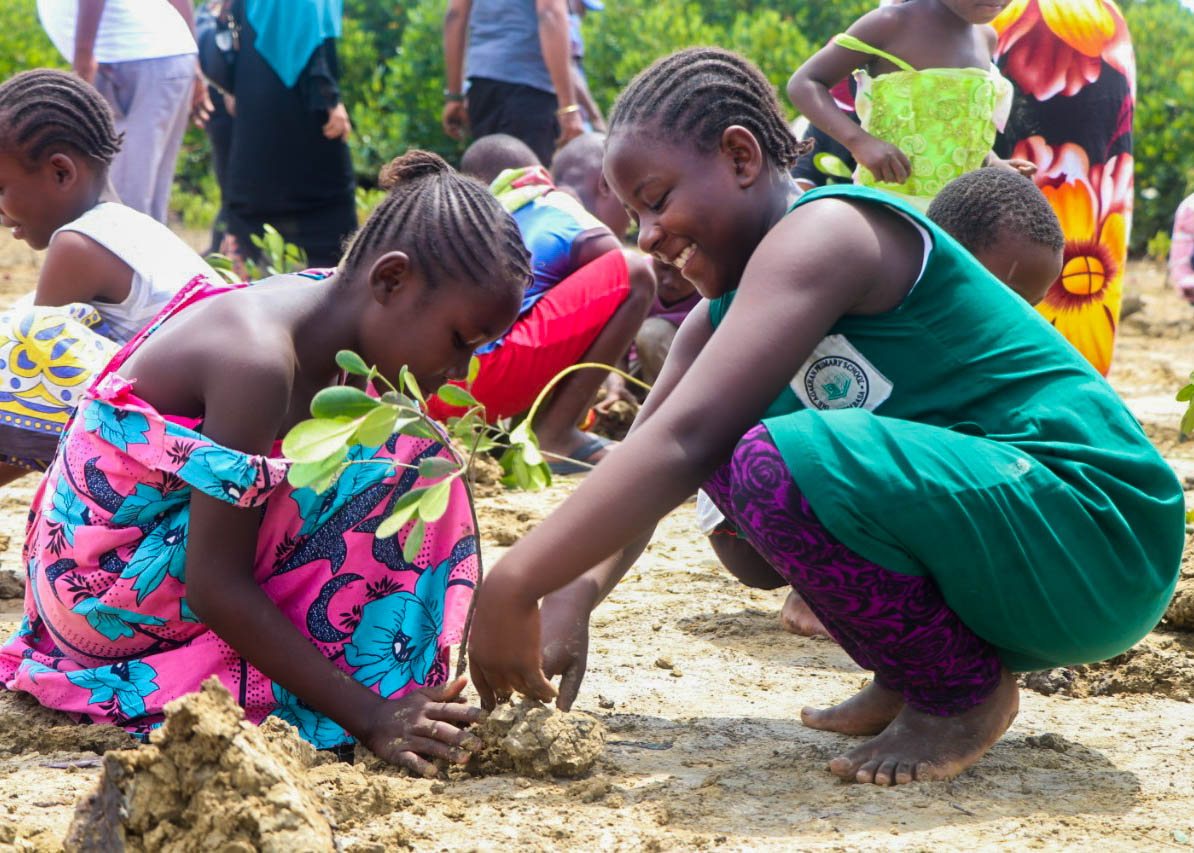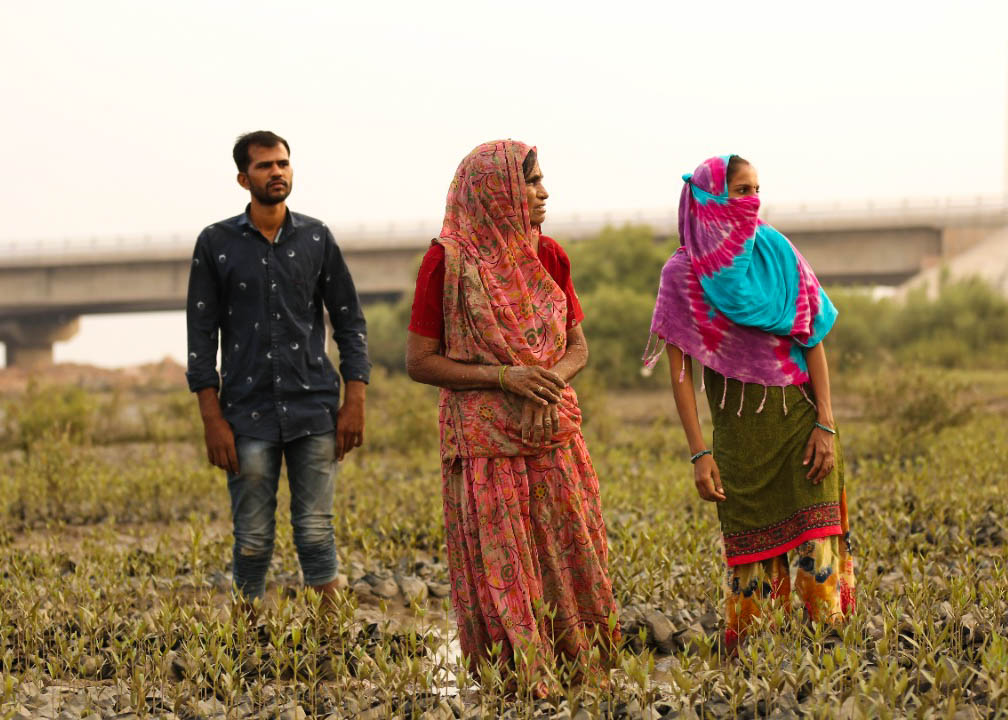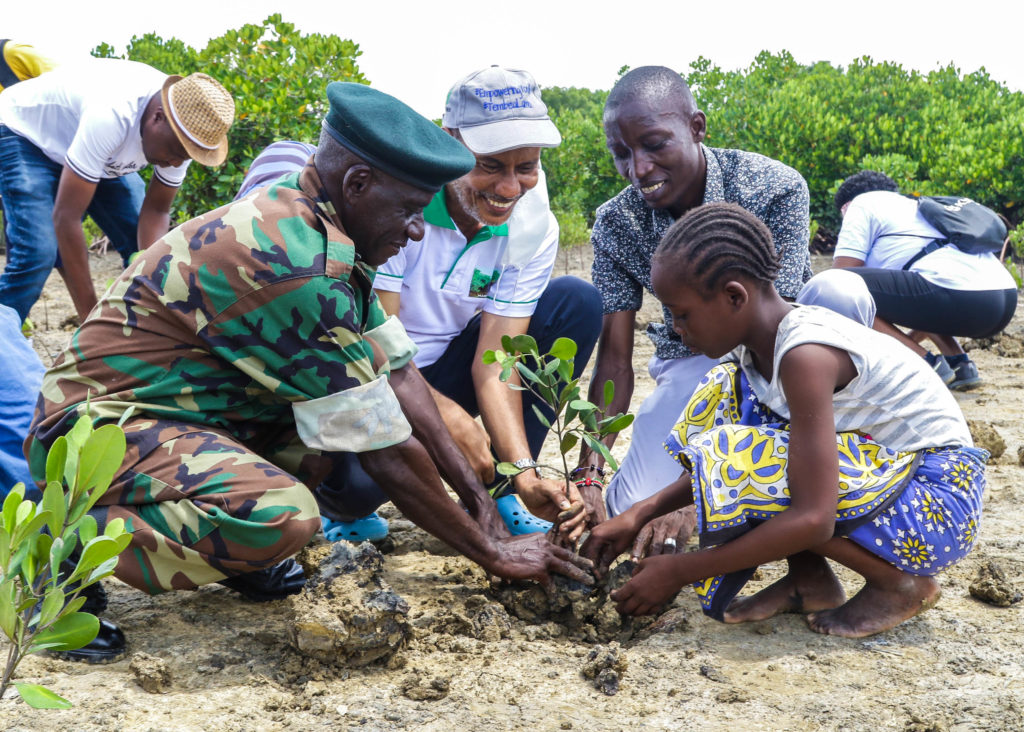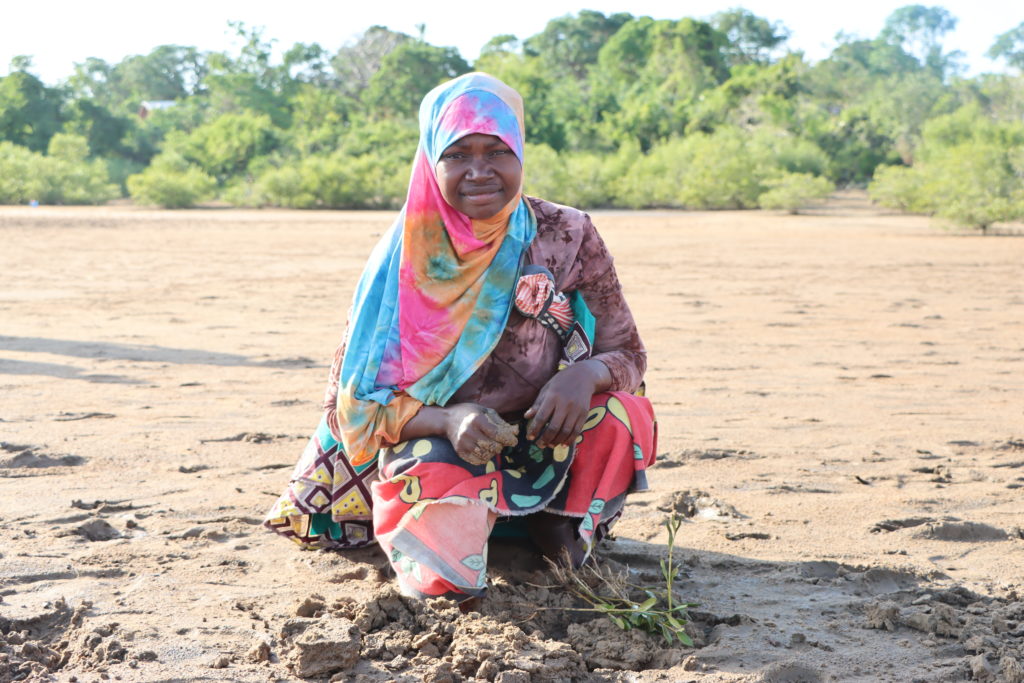For people and planet: AKF’s community-led mangrove restoration initiatives around the world
This World Oceans Day, we shine a light on the communities leading AKF’s conservation initiatives from India to Kenya and Mozambique

Mangrove forests are critical coastal ecosystems that offer myriad benefits to both people and planet. These salt-tolerant trees grow between land and sea in the world’s tropical and subtropical coastlines, supporting local livelihoods whilst providing essential ecosystem services. In the coastal regions where AKF works, we’re partnering with local communities to protect, conserve and restore these rich forests and celebrate their invaluable contribution to climate resilience.
Whilst mangroves maintain biodiversity, protect shorelines from severe weather, and support coastal livelihoods, their most powerful service is carbon sequestration. Carbon sequestration occurs when plants absorb carbon dioxide from the atmosphere and store it in their roots and sediments. Coastal ecosystems like mangroves, marshes and seagrass meadows sequester more carbon per unit area than terrestrial forests; in fact, globally, mangroves store the most carbon – 6.5 billion tonnes – despite only making up 27% of these ‘blue carbon’ ecosystems.
Restoring and conserving mangroves is vital to tackling the climate crisis, yet mangrove forests are under threat from sea-level rise and drought, as well as human impacts like urbanisation, pollution and deforestation. Whilst cutting mangroves for fuelwood is illegal in most countries, many people are left with no choice because of a lack of alternative income opportunities. In order to reap the rewards of mangrove forests, we must take a holistic approach, working closely with coastal communities to improve their quality of life in harmony with the natural environment.
In recent years, AKF has been addressing these issues in the coastal areas of India, Kenya and Mozambique. This World Oceans Day, learn about what we’re doing to protect mangrove forests and the communities which depend on them…
India – women-led restoration in Gujarat
Gujarat has the second largest mangrove cover in India, making up 23% of the country’s total forests. However, deforestation and water and soil pollution are causing this once rich habitat to rapidly degrade.
In Gandhavi, a small coastal village in the western region of Gujarat, women are leading the way in mangrove reforestation efforts. Since 2021, the Aga Khan Rural Support Programme (AKRSP) – an AKF initiative – has been working with local women’s groups to develop mangrove restoration as an alternative livelihood opportunity, with support from the Children’s Investment Fund Foundation (CIFF).

In partnership with local communities, authorities and the Forestry Department, AKRSP identified 33 hectares of land to be reforested with new mangrove seedlings. To lead these efforts, 30 women – mostly livestock farmers – were trained in mangrove planting, restoration and protection. Nearly 150,000 mangrove seeds were collected, and the women spent the first five critical months nurturing the seeds in a nursery, building and maintaining fencing, clearing algae and weeds, and removing pests.
Once the plants reached 50cm, they were transported to the site on the coast and planted at low tide to give them the best chance of survival. So far, 20 hectares of coastal land has been brought back to life with flourishing mangrove trees, and a further 13 hectares will be restored later this year. Once the mangroves have reached maturity, the women and their communities will be able to sustainably use the forests to provide fodder for their livestock and collect fuelwood for their homes. A win for them and a win for the environment.
After earning a daily wage for their work in nursery management and mangrove planting, several of the women have been able to buy more livestock to increase their income. AKRSP plans to replicate this initiative across the coastal belt of Gujarat, working in a participatory way to restore the region’s mangroves whilst also enhancing the quality of life of local communities.
Kenya – annual mangrove planting events in Mombasa
For the past three years, AKF and the Aga Khan Hospital Mombasa (AKHM) have facilitated community-led mangrove restoration efforts in Tudor Creek, Mombasa. Mombasa is a coastal city in southern Kenya and has around 3,700 hectares of mangroves. These peri-urban forests have become heavily degraded due to illegal harvesting, land encroachment and reclamation, waste dumping, and pollution. In Tudor Creek specifically, over 80% of mangroves have been lost in recent years.

In collaboration with other Aga Khan Development Network agencies and institutions – including Aga Khan Academies, Aga Khan Education Services, Madrasa Early Childhood Programme and Diamond Trust Bank – as well as the Kenya Forest Service and many local civil society organisations, AKF and AKHM launched the ‘Plant Your Age’ mangrove planting initiative in 2019. For one day every year, community members are invited to plant the number of mangrove seedlings equivalent to their age.
In 2019, 600 seedlings were planted, in 2020 the number increased to 3,000, and at the most recent event in November 2021, 5,000 mangroves were planted at Tudor Creek. The trees planted in previous years have been nurtured by local people and have seen an impressive 85% survival rate despite ongoing deforestation. These annual events are set to continue, and with the number of seedlings planted increasing year on year, together we hope to conserve and restore Mombasa’s rich coastal habitats for the benefit of local people and the environment.
Mozambique – sustainable beekeeping in Nampula’s mangroves
AKF’s latest community-led mangrove conservation initiative began in April 2022 in Nampula province, northern Mozambique. Here, local livelihoods are highly dependent on the surrounding natural environment, from fisheries to cotton production. Climate change is threatening these livelihoods and the quality of life of local communities, which is why AKF is supporting sustainable alternative livelihoods that protect local habitats.

With support from Prince Sadruddin Aga Khan Fund for Environment, AKF is working with 18 women’s associations in Nampula to support beekeeping as an alternative livelihood. In Nampula, beekeeping is carried out in the protective shelter of mangrove forests because of their constant supply of nectar and pollen and unlimited source of water. Therefore, in order to develop beekeeping as a sustainable source of income, it is necessary for the women and their communities to conserve and restore the surrounding mangrove forests.
The first phase of the project was recently completed, seeing 50 hectares of new mangrove forest planted and 250 hectares of existing mangroves protected. In total, this project aims to plant around 40,000 new mangrove trees and protect 750 hectares of existing mangroves. For these women, healthy mangrove forests means that they can continue to grow their beekeeping businesses, boosting income opportunities through honey production.
By engaging with local people in this way, we hope to support a culture of conservation and environmental stewardship amongst the communities in the places where we work. At AKF, we’ve seen first-hand that community-ownership is the key to unlock the long-term sustainability of development initiatives, whether they are seeking to improve health, education, livelihoods or the environment.
With thanks to the partners mentioned who are supporting these initiatives, including CIFF, AKHS Mombasa and Prince Sadruddin Aga Khan Fund for Environment.


Support our work Your donations are helping us build a future where we all thrive together.